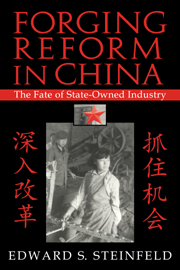Book contents
- Frontmatter
- Contents
- List of Tables and Figures
- Preface
- 1 Introduction: China's Ailing State Enterprises
- Part I Conceptual Approaches to Postsocialist Enterprise Reform
- 2 Property Rights, Privatization, and the State-Owned Firm
- 3 The Nested Problems Dynamic: An Alternative Approach
- Part II Enterprise Case Studies: The Commanding Heights in Transition
- Part III Reassessing Chinese Patterns of Economic Development
- Notes
- Bibliography
- Index
2 - Property Rights, Privatization, and the State-Owned Firm
Published online by Cambridge University Press: 12 January 2010
- Frontmatter
- Contents
- List of Tables and Figures
- Preface
- 1 Introduction: China's Ailing State Enterprises
- Part I Conceptual Approaches to Postsocialist Enterprise Reform
- 2 Property Rights, Privatization, and the State-Owned Firm
- 3 The Nested Problems Dynamic: An Alternative Approach
- Part II Enterprise Case Studies: The Commanding Heights in Transition
- Part III Reassessing Chinese Patterns of Economic Development
- Notes
- Bibliography
- Index
Summary
AMONG scholars of reforming socialist economies, the point that “institutions matter” is taken as something of a truism. After all, the shift from command planning to the market almost by definition involves an institutional revolution, a nearly complete shift in the rules of the game for economic actors, and an extraordinary transformation of the organizational environment in which those actors operate. As the institutional environment evolves, new incentives presumably bear down upon enterprise managers and government officials alike. Behavior in the most general sense, then, can be expected to shift accordingly. Government officials should cease micromanaging the firm, and instead should move toward more regulatory roles. Managers should cease hoarding inputs, and instead should expand profits. In the broadest sense, this conceptual linkage between institutional change – changes in the regulatory environment – and economic outcomes appears rather uncontroversial, particularly in the transitional environment.
Interestingly, scholars who otherwise differ on a range of issues tend to be rather unified in their choice of the relevant institution to study: property rights and ownership. Property-rights analysis has constituted a sort of explanatory chic for the 1990s, the means by which a whole range of outcomes in the postsocialist context are spelled out. The consensus view seems to be that reform entails a process of liberation, a dismantling of suffocating institutions, and a freeing up of individual enterprise and initiative. The idea is that once the old order is swept away, all the positive energies of societal actors somehow flower forth.
- Type
- Chapter
- Information
- Forging Reform in ChinaThe Fate of State-Owned Industry, pp. 27 - 44Publisher: Cambridge University PressPrint publication year: 1998



